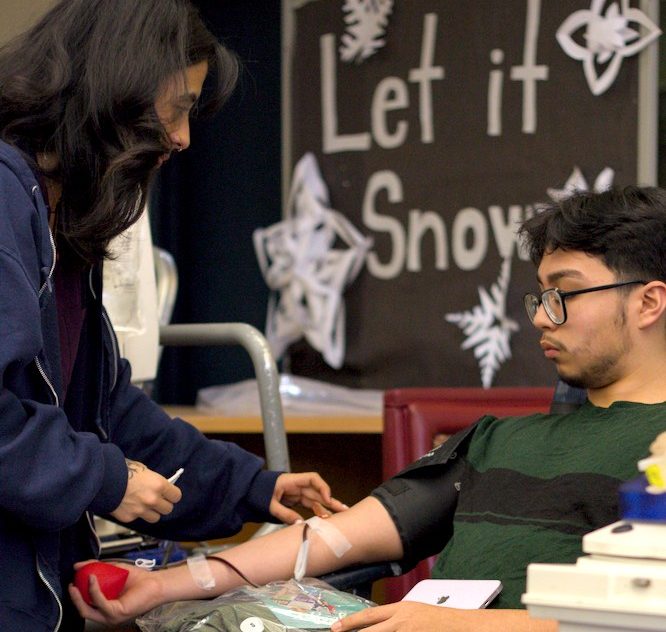On January 20, 2025, there was a significant increase in the deportation of immigrants by U.S. Immigration and Customs Enforcement (ICE). According to a senior White House official’s report to Daily Mail, 6,000 immigrants were detained within President Donald Trump’s first week in office. Many families in Charlotte were worried about what will happen next and are scared to send their children to school.
ICE is an agency under the Department of Homeland Security (DHS). Under Trump’s new executive order, ICE is now allowed to enter safe places like hospitals and churches, but most importantly, they can now enter schools. This new directive has caused worries, particularly for immigrant families and teachers, who worry about students’ safety.
“If it’s not student, it’s their families, if it’s not their families it’s their neighbors, it’s someone that they know,” Spanish teacher Frida Ibarra said.
Many teachers are worried for their students. Students have gone to teachers with questions and concerns about this situation. Ibarra said that a few students have expressed their concerns to her about ICE.
“There are for sure some kids who are afraid for themselves,” Ibarra said. “Whether it be because they were Brough here at a very young age or because they’re in an asylum process.”
To seek asylum, an individual must be in the United States and provide documents showing that they have suffered persecution on account of protected ground in the past or a well-founded fear of persecution in their home country.
Not only students but parents have been scared and even send their kids to school with a copy of their passport and birth certificate. CMS has issued guidelines to teachers are still confused on what to do. “CMS has provided some guidance, but the guidance is very vague. It’s not specific and there’s no call to action,” East Meck alumnus Juan Diego Mazuera-Arias and volunteer for Carolina Migrant Network said.
Earlier this month, the CMS Board of Education released a statement saying undocumented students have the right to a free public education. However, teachers and staff are not permitted to provide “Know Your Rights” cards, as the school board considers it legal advice, which is prohibited. “Know Your Rights” cards explain that individuals do not have to open the door for ICE agents without a warrant and that they have the right to remain silent.
“I want folks to know that they can do more to be involved in the community,” Mazuera-Arias said. “Find their local non-profit organization that supports immigrants, learn what they can do, share red [“Know Your Rights”] cards amongst each other.”
Local advocacy groups, including the Carolina Migrant Network and ourBRIDGE for KIDS, are coming together to provide legal resources and push for stronger protections in schools. Parents and teachers have also begun organizing community meetings to demand clearer policies from CMS. As the situation develops, our communities are still worried, hoping for clearer guidance and relief that schools will remain a safe space for all students, regardless of their immigration status.










Rory V • May 19, 2025 at 4:38 pm
The article opened my eyes on immigration and how immigration enforcement impacts a lot of families in our school. I agree with the writer’s point that the fear of ICE affects students both emotionally and academically. I understand more now how it is hard to focus on school when your worried about the safety of your family. I never realized how many people had this fear at East Meck. I think it would be beneficial if maybe there were some support groups or more resources from counselors and the school for students that are going through this right now. What are some ways students and staff can create a safer and more supportive school environment for everyone?
Rory V • May 19, 2025 at 4:37 pm
The article opened my eyes on immigration and how immigration enforcement impacts a lot of families in our school. I agree with the writer’s point that the fear of ICE affects students both emotionally and academically. I understand more now how it is hard to focus on school when your worried about the safety of your family. I never realized how many people had this fear at East Meck. I think it would be beneficial if maybe there were some support groups or more resources from counselors and the school for students that are going through this right now. What are some ways students and staff can create a safer and more supportive school environment for everyone?
giselle L. • May 13, 2025 at 9:59 am
I agree that the ICE situation is causing an effect on CMS students, them being worried at school for their families and themselves has caused an impact for them during school hours. I come to school scared about my family and myself with the ICE situation going on which causes an impact for many Hispanic students just because they never know if ICE is capable of coming to CMS schools. Students who are even scared for their parents to leave the house is not something we should worry about and I agree with you on this entire article speaking about it.
giselle L. • May 5, 2025 at 12:30 pm
I agree that the ICE situation is causing an effect on CMS students, them being worried at school for their families and themselves has caused an impact for them during school hours. I come to school scared about my family and myself with the ICE situation going on which causes an impact for many Hispanic students just because they never know if ICE is capable of coming to CMS schools. Students who are even scared for their parents to leave the house is not something we should worry about and I agree with you on this entire article speaking about it.